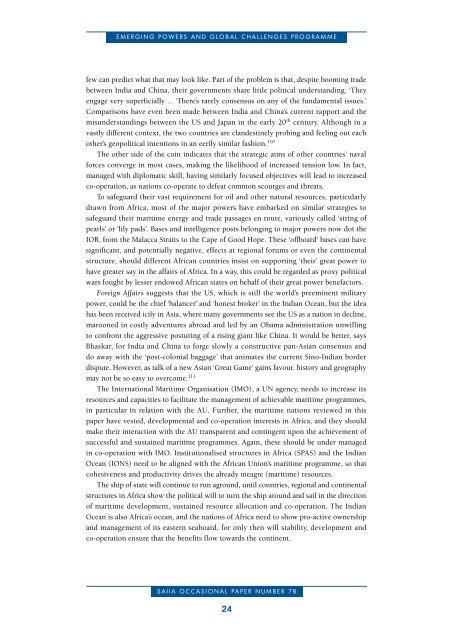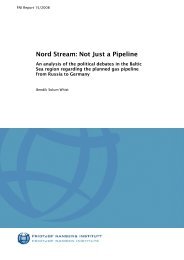Africa and the Geopolitics of the Indian Ocean
Africa and the Geopolitics of the Indian Ocean
Africa and the Geopolitics of the Indian Ocean
You also want an ePaper? Increase the reach of your titles
YUMPU automatically turns print PDFs into web optimized ePapers that Google loves.
EMERgINg POwERS ANd gLOBAL ChALLENgES PROgRAMME<br />
few can predict what that may look like. Part <strong>of</strong> <strong>the</strong> problem is that, despite booming trade<br />
between India <strong>and</strong> China, <strong>the</strong>ir governments share little political underst<strong>and</strong>ing. ‘They<br />
engage very superficially ... ‘There’s rarely consensus on any <strong>of</strong> <strong>the</strong> fundamental issues.’<br />
Comparisons have even been made between India <strong>and</strong> China’s current rapport <strong>and</strong> <strong>the</strong><br />
misunderst<strong>and</strong>ings between <strong>the</strong> US <strong>and</strong> Japan in <strong>the</strong> early 20 th century. Although in a<br />
vastly different context, <strong>the</strong> two countries are cl<strong>and</strong>estinely probing <strong>and</strong> feeling out each<br />
o<strong>the</strong>r’s geopolitical intentions in an eerily similar fashion. 110<br />
The o<strong>the</strong>r side <strong>of</strong> <strong>the</strong> coin indicates that <strong>the</strong> strategic aims <strong>of</strong> o<strong>the</strong>r countries’ naval<br />
forces converge in most cases, making <strong>the</strong> likelihood <strong>of</strong> increased tension low. In fact,<br />
managed with diplomatic skill, having similarly focused objectives will lead to increased<br />
co-operation, as nations co-operate to defeat common scourges <strong>and</strong> threats.<br />
To safeguard <strong>the</strong>ir vast requirement for oil <strong>and</strong> o<strong>the</strong>r natural resources, particularly<br />
drawn from <strong>Africa</strong>, most <strong>of</strong> <strong>the</strong> major powers have embarked on similar strategies to<br />
safeguard <strong>the</strong>ir maritime energy <strong>and</strong> trade passages en route, variously called ‘string <strong>of</strong><br />
pearls’ or ‘lily pads’. Bases <strong>and</strong> intelligence posts belonging to major powers now dot <strong>the</strong><br />
IOR, from <strong>the</strong> Malacca Straits to <strong>the</strong> Cape <strong>of</strong> Good Hope. These ‘<strong>of</strong>fboard’ bases can have<br />
significant, <strong>and</strong> potentially negative, effects at regional forums or even <strong>the</strong> continental<br />
structure, should different <strong>Africa</strong>n countries insist on supporting ‘<strong>the</strong>ir’ great power to<br />
have greater say in <strong>the</strong> affairs <strong>of</strong> <strong>Africa</strong>. In a way, this could be regarded as proxy political<br />
wars fought by lesser endowed <strong>Africa</strong>n states on behalf <strong>of</strong> <strong>the</strong>ir great power benefactors.<br />
Foreign Affairs suggests that <strong>the</strong> US, which is still <strong>the</strong> world’s preeminent military<br />
power, could be <strong>the</strong> chief ‘balancer’ <strong>and</strong> ‘honest broker’ in <strong>the</strong> <strong>Indian</strong> <strong>Ocean</strong>, but <strong>the</strong> idea<br />
has been received icily in Asia, where many governments see <strong>the</strong> US as a nation in decline,<br />
marooned in costly adventures abroad <strong>and</strong> led by an Obama administration unwilling<br />
to confront <strong>the</strong> aggressive posturing <strong>of</strong> a rising giant like China. It would be better, says<br />
Bhaskar, for India <strong>and</strong> China to forge slowly a constructive pan-Asian consensus <strong>and</strong><br />
do away with <strong>the</strong> ‘post-colonial baggage’ that animates <strong>the</strong> current Sino-<strong>Indian</strong> border<br />
dispute. However, as talk <strong>of</strong> a new Asian ‘Great Game’ gains favour, history <strong>and</strong> geography<br />
may not be so easy to overcome. 111<br />
The International Maritime Organisation (IMO), a UN agency, needs to increase its<br />
resources <strong>and</strong> capacities to facilitate <strong>the</strong> management <strong>of</strong> achievable maritime programmes,<br />
in particular in relation with <strong>the</strong> AU. Fur<strong>the</strong>r, <strong>the</strong> maritime nations reviewed in this<br />
paper have vested, developmental <strong>and</strong> co-operation interests in <strong>Africa</strong>, <strong>and</strong> <strong>the</strong>y should<br />
make <strong>the</strong>ir interaction with <strong>the</strong> AU transparent <strong>and</strong> contingent upon <strong>the</strong> achievement <strong>of</strong><br />
successful <strong>and</strong> sustained maritime programmes. Again, <strong>the</strong>se should be under managed<br />
in co-operation with IMO. Institutionalised structures in <strong>Africa</strong> (SPAS) <strong>and</strong> <strong>the</strong> <strong>Indian</strong><br />
<strong>Ocean</strong> (IONS) need to be aligned with <strong>the</strong> <strong>Africa</strong>n Union’s maritime programme, so that<br />
cohesiveness <strong>and</strong> productivity drives <strong>the</strong> already meagre (maritime) resources.<br />
The ship <strong>of</strong> state will continue to run aground, until countries, regional <strong>and</strong> continental<br />
structures in <strong>Africa</strong> show <strong>the</strong> political will to turn <strong>the</strong> ship around <strong>and</strong> sail in <strong>the</strong> direction<br />
<strong>of</strong> maritime development, sustained resource allocation <strong>and</strong> co-operation. The <strong>Indian</strong><br />
<strong>Ocean</strong> is also <strong>Africa</strong>’s ocean, <strong>and</strong> <strong>the</strong> nations <strong>of</strong> <strong>Africa</strong> need to show pro-active ownership<br />
<strong>and</strong> management <strong>of</strong> its eastern seaboard, for only <strong>the</strong>n will stability, development <strong>and</strong><br />
co-operation ensure that <strong>the</strong> benefits flow towards <strong>the</strong> continent.<br />
SAIIA OCCASIONAL PAPER NUMBER 78<br />
24













